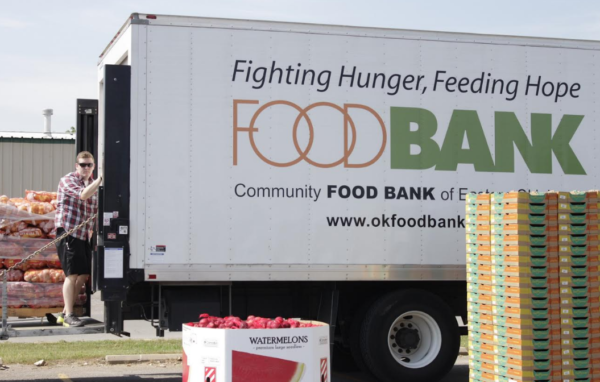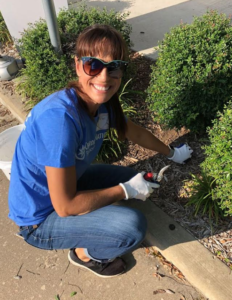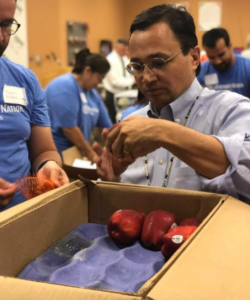
- Details
- By Press Releases
Press Release
Tribally owned company continues support of Oklahomans in need
 Jennifer Loren, director of Cherokee Nation Film Office and Original Content, volunteers at the Community Food Bank of Eastern Oklahoma during Tulsa Area United Way’s Annual Day of Caring.
Jennifer Loren, director of Cherokee Nation Film Office and Original Content, volunteers at the Community Food Bank of Eastern Oklahoma during Tulsa Area United Way’s Annual Day of Caring.
TULSA, Okla. – Cherokee Nation Businesses and its team of dedicated employee volunteers continue to ramp up support for local citizens and charitable organizations. The tribally owned company is partnering again with the Community Food Bank of Eastern Oklahoma.
CNB’s Community Impact Team, a companywide initiative dedicated to helping promote volunteerism and community engagement, supports the food bank through volunteer efforts and donations throughout the year.
“Cherokee Nation Businesses began its partnership with the food bank during the 2017 Day of Caring,” said Teressia Kehr, volunteer manager for the Community Food Bank of Eastern Oklahoma. “Shortly after, the connection deepened with monthly visits, their generous presenting sponsorship of the Feeding Oklahoma Drive in October, and ongoing support of Empty Bowls. Their employees have contributed over 1,224 volunteer hours through a wide variety of tasks.”
The collaboration to help end hunger in Oklahoma isn’t new. Cherokee Nation’s business arm and the food bank have remained community partners for the Tulsa Area United Way’s Annual Day of Caring for three years and counting. In 2019, Cherokee Nation Businesses, which was honored as the nonprofit’s Company of the Year, sponsored multiple fundraising events supporting the food bank, and groups of CNB employees volunteered monthly at the 78,000-square-foot Donald W. Reynolds Distribution Center, located in north Tulsa.
 Cherokee Nation Principal Chief Chuck Hoskin Jr. volunteers alongside CNB employees at the
Cherokee Nation Principal Chief Chuck Hoskin Jr. volunteers alongside CNB employees at the
food bank's Donald W. Reynolds Distribution Center.
“Their work has helped provide the equivalent of 49,019 meals for people in eastern Oklahoma and saved the food bank $31,126.32 in expenses,” Kehr said. “We can’t thank the organization and individual employees enough for their tireless work on behalf of the hungry.”
The Community Food Bank of Eastern Oklahoma distributes food and other grocery items to 350 partner agencies in eastern Oklahoma, including food pantries, emergency shelters, soup kitchens, senior citizen centers and after-school programs. Last year, the food bank distributed more than 28.9 million pounds of food throughout 24 counties in Oklahoma, including the Cherokee Nation Veterans Center in Tahlequah and several tribally partnered mobile pantries.
CNB employees dedicate thousands of volunteer service hours annually to community outreach projects and numerous charitable efforts, including the Community Food Bank of Eastern Oklahoma, Iron Gate, the Cherokee Nation Angel Project, Junior Achievement of Oklahoma and the Cherokee Heritage Center. Throughout the year, they also support numerous tribal, community, veteran and senior citizen events, as well as coordinate essential item and school supply drives, blood donation events and annual fundraising campaigns across northeast Oklahoma.
Find out more and help the food bank continue feeding one in six Oklahomans who struggle with food insecurity by visiting https://okfoodbank.org/get-
More Stories Like This
Native News Weekly (August 25, 2024): D.C. BriefsUS Presidents in Their Own Words Concerning American Indians
Native News Weekly (December 14, 2025): D.C. Briefs
Wounded Knee Massacre Site Protection Bill Passes Congress
Two Murdered on Colville Indian Reservation
Help us defend tribal sovereignty.
At Native News Online, our mission is rooted in telling the stories that strengthen sovereignty and uplift Indigenous voices — not just at year’s end, but every single day.
Because of your generosity last year, we were able to keep our reporters on the ground in tribal communities, at national gatherings and in the halls of Congress — covering the issues that matter most to Indian Country: sovereignty, culture, education, health and economic opportunity.
That support sustained us through a tough year in 2025. Now, as we look to the year ahead, we need your help right now to ensure warrior journalism remains strong — reporting that defends tribal sovereignty, amplifies Native truth, and holds power accountable.
 The stakes couldn't be higher. Your support keeps Native voices heard, Native stories told and Native sovereignty defended.
The stakes couldn't be higher. Your support keeps Native voices heard, Native stories told and Native sovereignty defended.
Stand with Warrior Journalism today.
Levi Rickert (Potawatomi), Editor & Publisher
